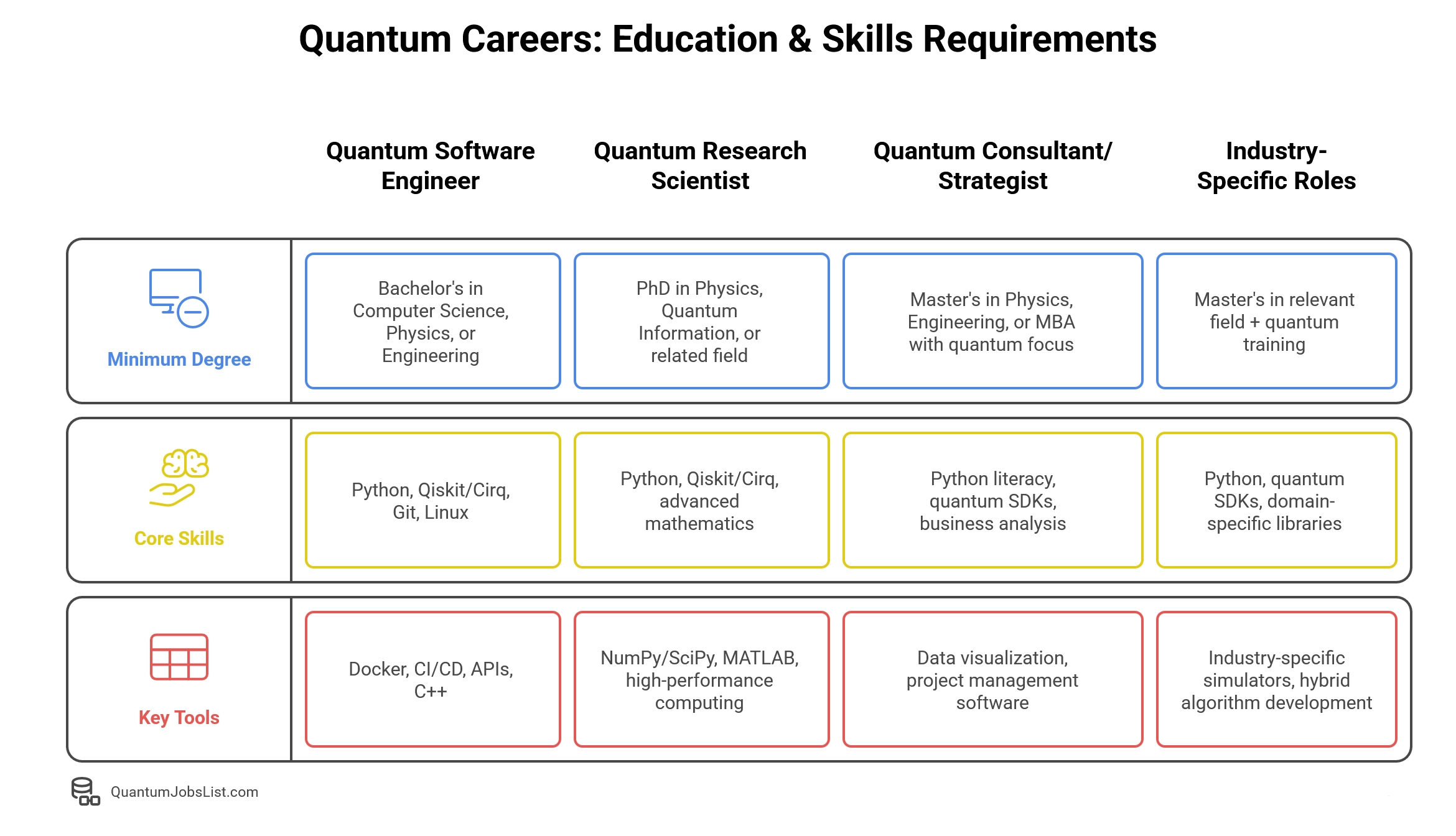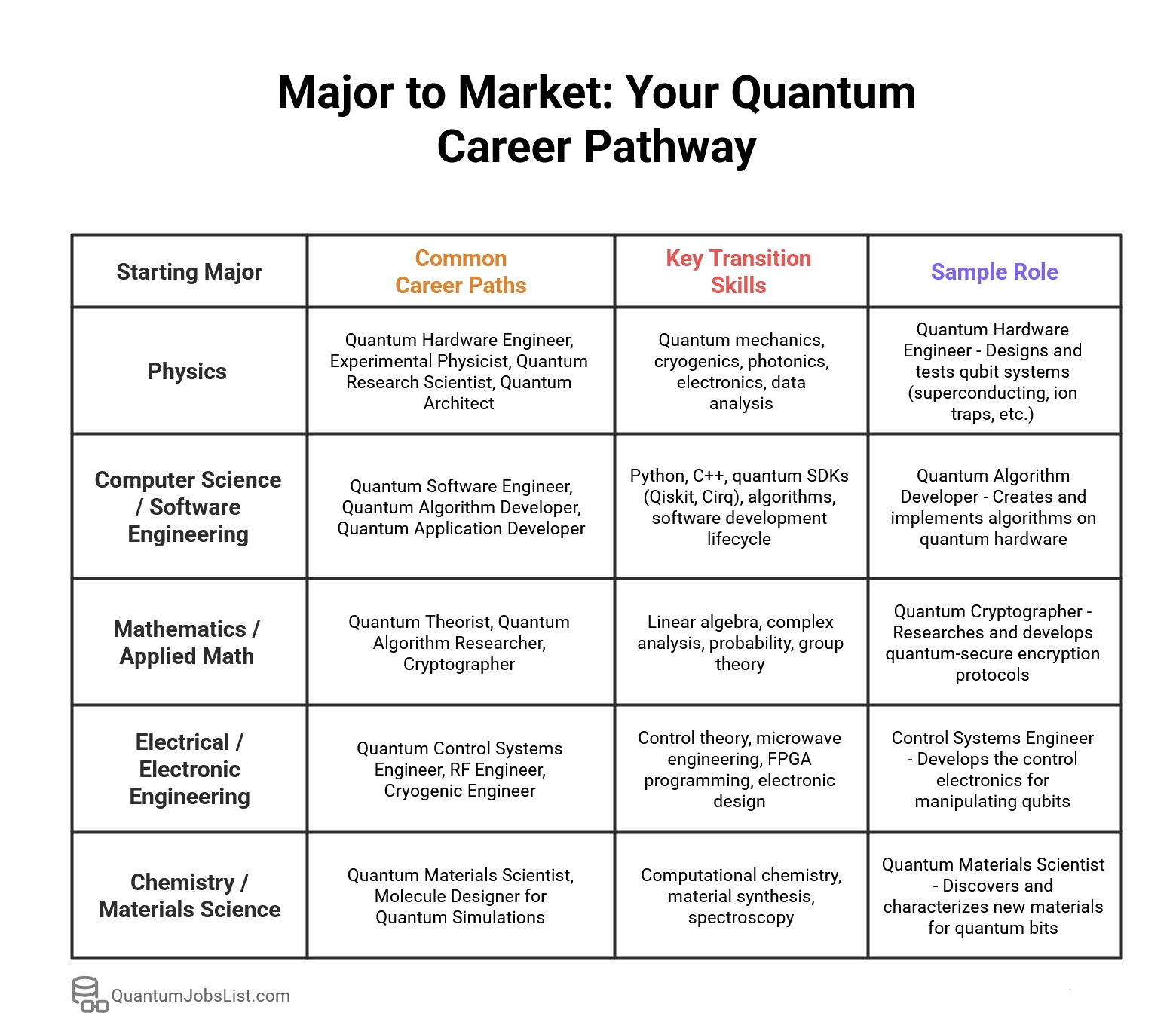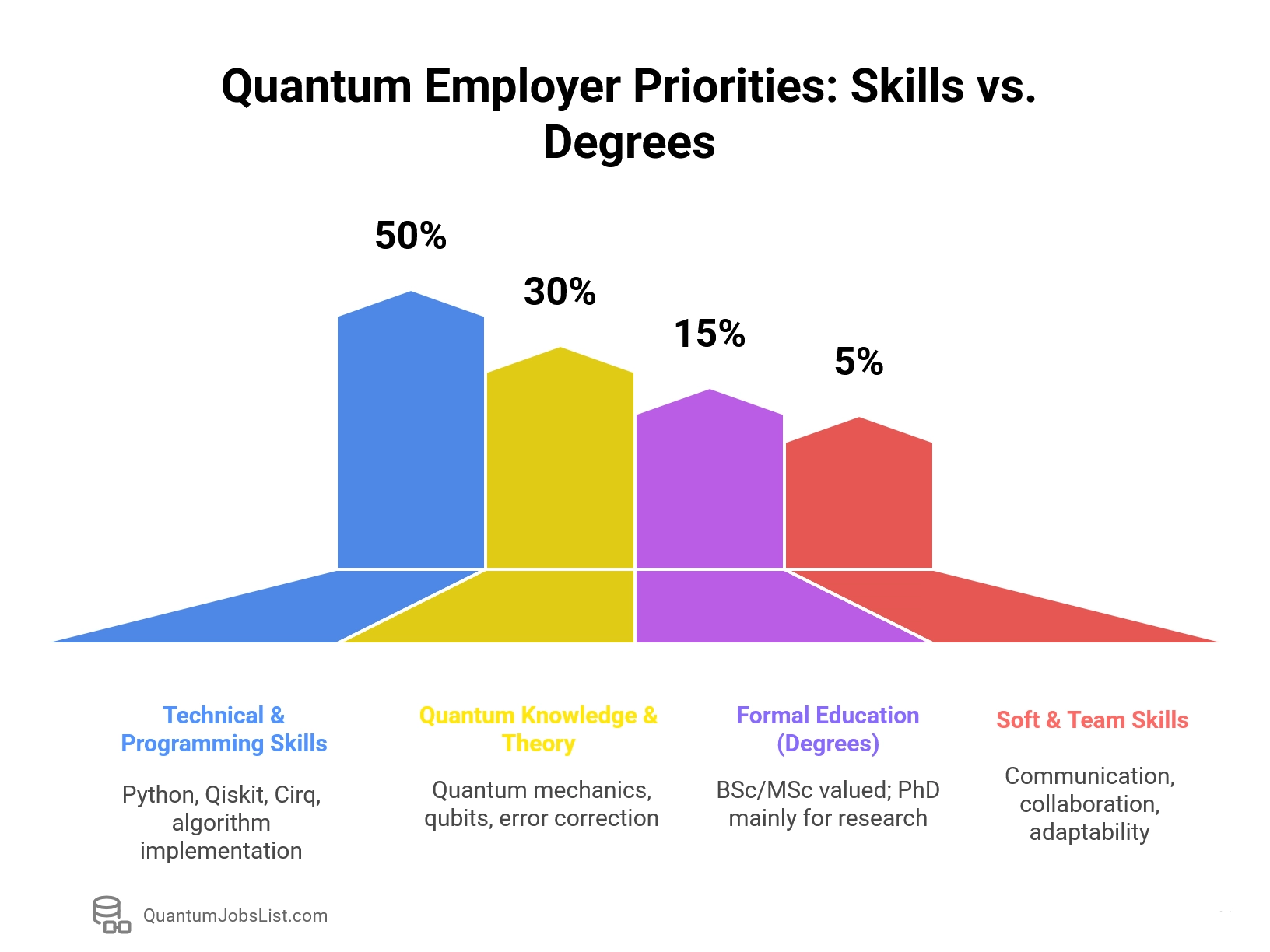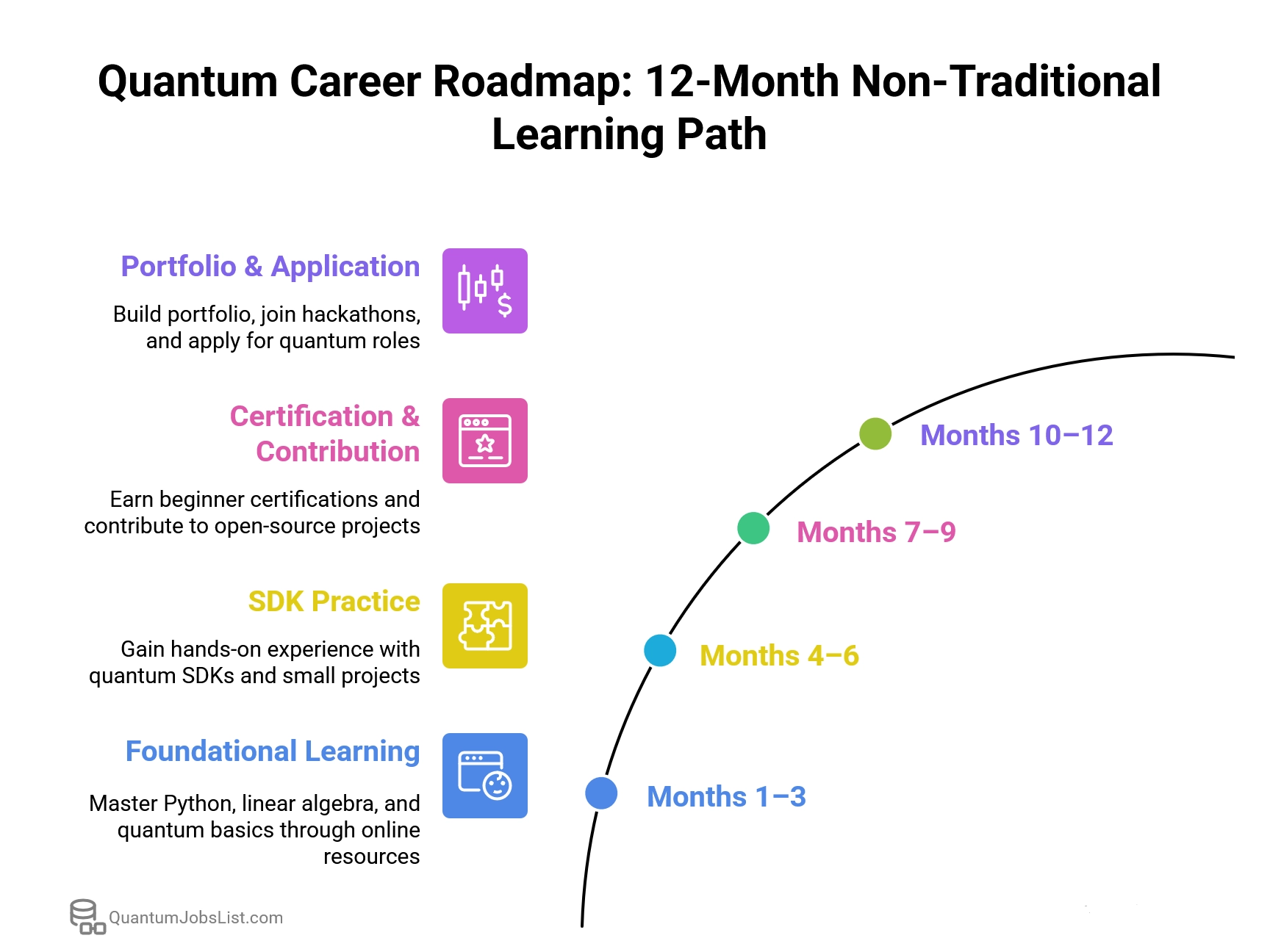14 Min. Read
Nov 3, 2025
What Qualifications You Need for a Quantum Computing Job?
Find out what qualifications you need for quantum jobs, whether a PhD is required, and which industry skills and degrees launch a quantum career.
Do You Really Need a PhD for Quantum Computing Jobs?
The growth of the quantum computing industry is remarkable. However, many skilled professionals hesitate to enter the quantum field. They believe that a PhD is a requirement. This assumption, however incorrect, seems to jeopardize both the professionals and the employers.
According to the 2024 MIT Technology Review, the quantum computing industry needs professionals at all levels. They are eager to train strong candidates who want to learn, rather than looking for "perfect" candidates who may not exist.
While the quantum computing field needs strong, skilled professionals, the entry requirements for most positions are not as high as people assume. The divergence in requirements is largely a factor of the specific role, the particular company, and/ or the industry sector.
For instance, many software engineering positions consider applicants who hold a bachelor’s degree. In technical writing, the ability to communicate is key, and for many firms, the ability to solve practical problems is more important than the degree an applicant holds.
The study revealed that out of 5,000 quantum jobs posted by the QED-C and the Quantum Computing Report in 2022 & 2023, 55% required a bachelor's degree or less. This percentage demonstrates a real opportunity for adult learners or people wishing to shift careers. Quantum Economic Development Consortium (QED-C) & Quantum Computing Report (2023)
This guide shows the varying qualifications for the different positions offered in quantum computing and explains the candidates' degree requirements for 10+ positions within quantum computing, as well as which skills are most desirable, helping professionals better align their current qualifications for positions in quantum computing. This guide will help recent graduates, people in the middle of their careers, and those looking to shift jobs to quantum computing.
What Education Do Most Quantum Computing Jobs Actually Require?
As the quantum computing industry moves from research to commercialization, the educational requirements for this industry are changing. Understanding these changes in standards helps job seekers make informed decisions about their career readiness and the qualifications they choose to pursue.
Are Bachelor's Degrees Enough for Quantum Careers?
For a majority of quantum computing jobs, particularly in software development, technical writing, project management, and applications engineering, a bachelor's degree is adequate. Prominent companies like IBM, Microsoft, Amazon, and Google frequently recruit quantum computing professionals with four-year degrees in relevant STEM disciplines.
The key factors that make bachelor's degree holders competitive include:
- Strong programming fundamentals in Python, C++, and JavaScript
- Solid mathematical foundation in linear algebra, statistics, and discrete math
- Proven problem-solving ability through projects & work experience
- High curiosity & learning agility to keep pace with the evolving field
Companies appreciate that teaching quantum-specific skills may be easier than teaching the required foundational technical skill set. Computer science graduates with knowledge of algorithms, data structures, and software engineering can learn to use quantum programming languages Qiskit and Q# with targeted training.
When Do You Actually Need a Master's Degree?
Master's degrees become advantageous for specialized quantum roles and accelerated career progression. Advanced degrees particularly benefit professionals targeting:
- Quantum R&D (Algorithm & Theoretical Development)
- Senior Technical & Strategic Leadership
- Cross-Disciplinary Applications (e.g., Finance, Healthcare, Materials Science)
- Consulting & Advisory Services
Many employers value the structured learning that comes with a master’s degree in quantum information science, quantum computing, or a related field. Ultimately, the real impact on your skills and career will depend on the quality of the program, the availability of research opportunities, and how well it aligns with the candidate's career aspirations.
Which Quantum Jobs Still Require PhDs?
PhD requirements remain limited to specific research-focused positions:
- Quantum Research Scientist (e.g., at IBM, Google, Microsoft)
- University Faculty (Academic Research)
- Principal Research Engineer (Leading Theoretical Development)
- Government Research (National Laboratories)
Even in these areas, the landscape is shifting. Some companies now hire "research engineers" with master's degrees; who focus on applied research rather than fundamental theory development.
Suggested Read: How to get Quantum Job without PhD.
The quantum computing industry is hungry for talent at all levels, and companies are increasingly willing to train candidates with strong foundational skills rather than wait for perfectly qualified applicants. MIT Technology Review (2024)

What's the minimum education needed to work in quantum computing?"
The education required for different jobs in quantum computing varies. Most entry-level jobs expect a person to at least have a bachelor’s degree in a STEM discipline. For quantum software engineers, degrees in computer science, physics, or mathematics are suitable, while quantum technical writers may excel with degrees in communication or engineering.
However, the industry is becoming more flexible - IBM Quantum Hiring Manager notes that:
We're looking for people who can think quantumly, not necessarily people who have quantum degrees.
Some quantum job positions do not require a formal degree, especially at startups. In these cases, they look for demonstrated skills and experience, or even substantial self-taught skills. In these scenarios, showing the ability to do practical quantum programming and the necessary mathematics is more important than any degree a person may hold.
Which Academic Backgrounds Work Best for Quantum Computing?
Different academic backgrounds offer various benefits in quantum computing. However, your success will depend more on the skills they develop alongside their education and discipline; as well as how effectively they acquire specific skills related to quantum computing.
Why Do Physics Majors Have an Advantage?
Graduates in physics tend to have more advantages in the different disciplines of quantum computing. This is because they understand quantum mechanics and they have the necessary mathematical training and learned methodologies.
Physics majors typically excel in:
- Quantum mechanics intuition:- Understanding superposition, entanglement and measurement from undergraduate coursework.
- Theoretical thinking:- Ability to work with abstract concepts & mathematical models.
- Mathematical rigor:- Advanced linear algebra, differential equations, and statistical mechanics.
- Experimental methodology:- Laboratory experience with measurement, data analysis, and error assessment.
However, physics majors often need additional training in:
- Software engineering practices: Version control, testing and large-scale software development.
- Business applications: Understanding how quantum computing solves real-world problems.
- Communication skills: Translating technical concepts for diverse audiences.
Can Computer Science Graduates Succeed in Quantum?
Graduates in computer science perform exceptionally well, matching physics majors in software-focused quantum computing jobs.Their programming skills and knowledge of software engineering are quickly useful to quantum development teams.
CS graduates bring essential skills including:
- Programming proficiency:- Strong foundation in multiple languages, algorithms, and data structures.
- Software architecture:- Understanding of system design, scalability, and performance optimization.
- Development methodologies:- Experience with agile development, testing, and deployment practices.
- Problem decomposition:- Ability to break complex problems into manageable components.
Computer science graduates should focus on developing:
- Quantum programming skills:- Proficiency with Qiskit, Cirq, or Q# through online courses and practice.
- Mathematical foundations:- Linear algebra and probability theory relevant to quantum computing.
- Quantum algorithm understanding:- Familiarity with key quantum algorithms and their applications.
More and more hybrid jobs in quantum will appear. Many future jobs will combine quantum and classical skills: Take classes in physics, computer science and mathematics. Check with your institution for any available quantum computing lectures. Quantum Jobs USA Career Expert (2025)
Can you get quantum computing jobs with a computer science degree?
Without a doubt, computer science graduates have a great career, particularly in software development for quantum computing. Companies such as Microsoft, Google, and Amazon recruit CS graduates for quantum software engineering, simulation, and applications development. Strong programming skills and understanding of data structures and system design, give them an advantage.
- Learn the quantum tools:- Use online courses like IBM Qiskit & work on your own small quantum projects.
- Know the key algorithms:- Learn how algorithms like Grover's and Shor's work to connect theory with real use.
- Learn by doing:- Many top quantum developers started in CS and learned quantum by getting hands-on experience and always learning new things.
What About Mathematics and Engineering Degrees?
Graduates with a major in math or engineering have skills that are useful in quantum computing. They can work on practical optimization, simulation, and developing algorithms.
Mathematics majors contribute:
- Abstract reasoning:- Able to work with complex math and logic.
- Optimization expertise:- Skilled at making algorithms and systems run at their best.
- Statistical analysis:- Good at understanding data, measurements, and errors;
- Logical thinking:- Solves problems in a clear, step-by-step way.
What Engineering Graduates Offer:
- Systems thinking:- Sees how all the parts of a big project work together.
- Practical focus:- Good at building solutions that work in the real world.
- Project management:- Can organize and lead large technical projects;
- Broad knowledge:- Understands how to apply skills to different fields and problems.
Do Non-STEM Backgrounds Ever Work in Quantum?
Candidates without a STEM background can also do well in quantum computing, especially in roles focused on communication, business development, project management, and strategic planning. Needs in the quantum sector go well beyond the technical, so these other skills are also invaluable.
Successful non-STEM quantum professionals often work in:
- Quantum technical writing:- Making documentation, tutorials & learning materials.
- Quantum sales and marketing:- Explaining the benefits of quantum computing to companies.
- Quantum project management:- Leading and organizing complex quantum projects.
- Quantum business development:- Finding new uses & partners for quantum technology.
What you need to succeed:
- Technical curiosity:- Wanting to learn how quantum computing works.
- Strong communication skills:- Able to explain technical ideas to non-experts.
- Domain expertise:- Knowing a lot about a specific industry, that can use quantum computing.
- Continuous learning:- Keeping up with new developments in the field.
What Technical Skills Matter Most to Quantum Employers?
To work in quantum computing, you need a mix of programming skills; such as math knowledge, and experience in the field. It is also important to understand the business side and have a genuine interest in it. Knowing the skills that employers are interested in can help direct your learning and career efforts.
Which Programming Languages Should You Learn First?
Quantum programming is mostly done in Python, which should be the first programming language for every quantum professional. The quantum ecosystem is built around Python and includes numerous standard libraries for quantum computing, simulations, and algorithms.
Essential Quantum Programming Languages:
- Python with libraries:- The main tool for most people, using Qiskit, Cirq, or PennyLane.
- Q# (Microsoft):- A special language made just for quantum, used with their Azure cloud.
- JavaScript:- Used for making quantum websites and visual tools;
- C++:- Needed for fast simulators and working directly with quantum hardware.
- Julia:- Becoming popular for research and complex math.
What to Learn Based on Your Career:
- Quantum Software Developer:- Python and one cloud platform (like Qiskit or Q#).
- Quantum Researcher:- Python and Julia for calculations;
- Quantum Web Developer:- JavaScript and visualization libraries.
- Quantum Hardware Engineer:- C++ for high-performance code.
Suggested Read: Top 15 Programming Languages for Quantum Jobs
What programming languages are most important for quantum computing jobs?
Python has become the leading language for quantum computing, used by 90% of quantum computing developers worldwide. Major quantum computing frameworks such as Qiskit by IBM, Cirq by Google, or PennyLane by Xanadu, as well as the Quantum Development Kit by Microsoft all use Python.
Moreover, JavaScript has started to gain popularity within quantum computing for the development of web-based quantum applications and quantum data visualization.
C++ remains crucial for high-performance quantum simulators, control systems, and hardware integration. For career focus:
- Quantum software engineers should master Python with Qiskit or Cirq;
- Quantum hardware engineers need C++ for firmware and device control;
- Quantum researchers gain an edge with Python & Julia for advanced simulations;
- Quantum web developers should learn JavaScript with visualization libraries.
The majority of employers globally seek quantum programmers with an extensive Python programming skill set. The first step to enter the field is to know Python and at least one quantum computing framework.
Usually educated to PhD level or equivalent in a Physics, Computer Science or Engineering related discipline or similar equivalent experience, the candidate should have a sound knowledge of all qubit modalities. The Quantum Insider Industry Analysis (2024)

What Mathematical Knowledge Is Actually Essential?
The mathematics of quantum computing is less daunting than assumed. The focus is on specific, more applied areas rather than extensive pure theory.
Core mathematical competencies include:
- Linear algebra:- Vectors, matrices & how they change things.
- Probability and statistics:- How to understand random results and measurements.
- Complex numbers:- The number system used to describe quantum states;
- Basic calculus:- Helps with improving algorithms and analysis.
Advanced Math for Specialists:
- Group theory:- Used for finding & fixing errors in quantum systems.
- Number theory:- The math behind breaking codes with Shor's algorithm.
- Information theory:- Important for secure quantum communication;
- Optimization theory:- Key for algorithms that "train" quantum computers.
The majority of quantum programming positions require a more practical mathematical knowledge rather than theorem-proving in mathematics. The more relevant aspect is the know-how of applying the relevant mathematics instead of deriving it.
How Important Are Quantum-Specific Certifications?
Quantum certificates are great to have as they show commitment and help gain credibility, but they are meant to complement practical experience, not replace it.
Good Quantum Certifications to Get:
- IBM Qiskit Developer:- The most well-known certificate for quantum coding.
- University Certificates:- Official programs from schools like MIT and Stanford;
- Microsoft Azure Quantum:- Good for jobs that use the cloud for quantum computing.
- Google Quantum AI:- A newer certificate for their tools and quantum machine learning.
Why Get Certified:
- Better Resume:- Shows you are serious and have real skills.
- Higher Pay:- People with these certificates often earn 10-15% more.
- Learn the Basics:- Gives you a clear and complete learning path;
- Job Recognition:- Many employers look for these certificates.
What Hands-On Experience Do Employers Want?
Experience in practical quantum programming is more highly considered by employers than just theoretical knowledge or any level of academic qualification.
Good Ways to Get Hands-On Experience:
- A GitHub profile:- Share your quantum code to show what you can do.
- Quantum hackathons:- Join events like iQuHACK to solve problems;
- Help with open-source:- Work on quantum software projects with others.
- Your own projects:- Build something new to show your ideas and motivation.
How to Start Gaining Experience:
- Follow tutorials:- Do the exercises in the Qiskit Textbook and IBM's online labs.
- Share what you learn:- Write a simple blog post or make a video to explain a concept.
- Code famous algorithms:- Practice by building Grover's search & other key algorithms;
- Make a small application:- Build a project that fits an industry you like.
You do not need to be a quantum anything to work in a quantum company, whether you have a PhD or a high school degree. Dana Anderson, CTO of Infleqtion

How Do Qualification Requirements Vary by Job Level?
A career in quantum computing follows a clear path. It starts with building technical skills and then moves on to developing advanced strategic skills and leadership abilities. This experience, while not necessary, is helpful to be able to plan their career development, including growth expectations and timelines.
What Do Entry-Level Quantum Positions Require?
The skills, interests, and ability to learn are core differentiators of a candidate's potential to an employer during recruitment.As such, experience becomes the least relevant criterion when considering applicants for the basic quantum positions.
What You Typically Need to Get Started:
- A Bachelor's degree:- In computer science, physics, math, or engineering.
- Basic coding skills:- The ability to write clear and working code.
- Problem-solving skills:- Shown through projects or school work.
- Math knowledge:- Understanding of linear algebra, probability and complex numbers.
- Basic quantum knowledge:- Familiarity with the main ideas from a course or self-study.
What Entry-Level Jobs Often Offer:
- Training:- Companies teach you the quantum skills you need.
- Flexible future:- You can choose to specialize in what you are good at & enjoy.
- Mentorship:- Experienced coworkers help you learn and grow.
- Varied work:- You get to try different projects and technologies.
Starting salaries for entry-level positions in quantum computing range from $75,000 - $120,000 a year, depending on the location, company size, and job description. You can learn more about Quantum Jobs salaries here.
How Do Mid-Level Role Requirements Differ?
The requirements for mid-level quantum roles emphasize specialized skills developed through 3 to 5 years of experience in the field.
What is Expected at a Mid-Level:
- A proven record:- You have successfully completed quantum projects.
- Deep knowledge:- You are an expert in a specific area, like algorithms or hardware;
- Teamwork:- You have experience working with different kinds of teams on complex projects.
- Leadership:- You can guide junior staff & help make technical decisions.
- Business sense:- You understand how quantum computing is used in business.
What Mid-Level Professionals Often Do:
- Lead teams:- Manage developers and make sure projects are on time.
- Work with customers:- Be the technical expert in talks with clients;
- Drive research:- Lead projects that turn ideas into real-world applications.
- Help plan strategy:- Help decide what products to build & how to build them.
Compensation for mid-level quantum roles ranges from $130,000 - $180,000 a year, with significant variation based on specialization and company type.
Suggested Read: Top Entry Level Quantum Jobs
What Qualifications Lead to Senior Quantum Positions?
Senior quantum roles require strategic thinking, industry influence, and ability to shape quantum computing's commercial development.
Senior-level qualifications typically include:
- Advanced degree or equal experience:- A Master's degree or many years of proven work in the field.
- Broad technical skills:- Deep expertise in several different quantum areas & new technologies;
- Industry recognition:- Known through talks, articles, or being a leader in the quantum community.
- Business understanding:- Knows how quantum computing can make money & fit into the market.
- Proven impact:- A history of starting and leading important quantum projects that succeed.
Senior quantum professionals often manage:
The level of responsibility and pressure from expectations are important in determining the value of a quantum business leader. This leader will be responsible for all profits and losses related to quantum products and will be focused on their success.
They will create strategies to strengthen the commercial position of the business unit in the market, developing and managing partnerships for quantum hardware, quantum cloud infrastructure, and core customers. At the same time, developing talent is crucial.
This includes building specialized quantum teams and improving the organization’s overall quantum skills. Ultimately, this role requires strong leadership in innovation. The individual will set the technical vision and guide the organization’s quantum research priorities to keep it at the forefront of this cutting-edge field.
Senior quantum compensation frequently exceeds $200,000 a year. This amount is due to significant equity upside at quantum companies and performance bonuses at established enterprises.
Suggested Read: Quantum Jobs Salaries
Which Industries Have Different Quantum Qualification Standards?
The qualification requirements for different industries highlight the unique use cases for quantum computing technologies and the variable degrees of quantum implementation within an industry. Acknowledging these nuances enables you to focus your skill investment and career alignment.
How Do Tech Companies Evaluate Quantum Candidates?
Companies in the technology sector generally emphasize the importance of practical programming abilities and the potential for direct contributions to ongoing quantum software development initiatives. Their selection processes emphasize technical skill and cultural alignment over formal qualifications.
What Tech Companies Look For:
- Coding skill:- Can you write code in an interview using tools like Qiskit?
- Product thinking:- Do you focus on what users actually need?
- System design:- Do you understand how to build and scale software?
- Open-source work:- Have you worked with others on public code projects?
- Fast learner:- Can you pick up new quantum tools quickly?
What Big Companies (Microsoft, Google, etc.) Offer:
- Training:- They teach you about quantum computing when you start.
- Flexible career:- You can move between quantum & regular computing jobs.
- Research:- You can work with their top quantum research teams;
- Cool projects:- You get to use the latest hardware and work with people worldwide.
Tech company quantum roles typically offer competitive base salaries plus substantial stock compensation. This is why total packages often exceeding $150,000 a year for experienced professionals.
You don’t need to be a physicist to work at a quantum company. Antoine Martin, Software Engineer at Alice & Bob.
Do different quantum computing companies have different qualification requirements?
Yes, qualification requirements for quantum computing roles differ widely by company type and industry.
The roles in quantum computing differ significantly by company type and sector:
- Major firms like IBM, Microsoft, and Google prioritize strong programming and system design skills; often recruiting software engineers and training them in quantum technologies like Qiskit and Cirq.
- Startups such as IonQ and Rigetti look for adaptable, curious candidates, favoring motivation over formal qualifications.
- In the financial sector, companies like JPMorgan Chase prefer candidates with quantitative backgrounds in data science & knowledge of finance operations.
- For defense and aerospace roles, companies need engineers with active security clearance and expertise in quantum sensing & communication systems.
- Academic spin-offs usually require master’s or PhD degrees, while consulting firms emphasize communication, analytical thinking, and business strategy.
Globally, startups tend to offer flexibility and broader roles. While large corporations provide structured growth paths. The best approach is to align your education, skills and goals with the company’s hiring criteria and project focus.
What Do Financial Services Quantum Roles Require?
The application of quantum computing in financial services focuses on trading, risk management, portfolio optimization, compliance, and regulatory oversight. These roles combine industry expertise with the practical application of quantum technology.
Financial services quantum qualifications often include:
- Math and stats skills:- Strong ability with numbers, data, and models.
- Finance knowledge:- Understand trading, investments, and risk.
- Clear communication:- Can explain quantum tech to business people.
- Rules awareness:- Know the financial laws and regulations.
- Data skills:- Experience working with financial data and research.
Financial services quantum applications focus on:
To improve their competitiveness, financial services companies are leveraging advanced quantum computing technology. In investment management, quantum computing technologies accelerate derivatives pricing through Quantum Monte Carlo methods. These methods are capable of pricing complex derivatives with greater precision and speed.
Quantum computing also resolves complex asset allocation and risk management challenges in portfolio optimization. Quantum-enhanced strategic alterations enhance algorithmic trading by automating trading strategies. In security trading, quantum machine learning helps detect fraud by finding important details in large sets of transaction data.
Compensation changes in financial services are based on performance bonuses. These bonuses are tied to profits made from trading and managing risks. For senior staff, overall remuneration packages are usually more than $200000 a year.
Are Defense Contractor Requirements Different?
Defense contractors prioritize having security clearances, systems engineering experience, and knowledge of the national security implications of quantum sensing, communication, and computing projects.
Defense quantum qualification requirements typically include:
Roles in this sector require an exceptional combination of certificates and technical expertise. An eligibility requirement is security clearance, which entails U.S. Citizenship and the ability to obtain government clearances.
Profound systems engineering experience is crucial for understanding complex systems integration and testing, along with hands-on experience with hardware like quantum sensors or communication systems.
Additionally, demonstrated experience in project management is vital, especially in dealing with the unique characteristics of government contracting and program management. Knowledge in areas like aerospace, communications, and sensing is important for connecting advanced quantum technology to real-world uses.
Defense quantum applications include:
- Quantum sensing:- Better navigation and highly sensitive detection tools.
- Quantum communication:- Extremely secure communication systems, that can not be hacked.
- Quantum computing:- Breaking codes, solving complex logistics and simulating new materials.
- Quantum radar:- New types of radar that are harder to detect and can see stealth objects.
Quantum positions in the defense sector provide outstanding job security and generous benefits. You can also have the chance to engage with advanced technologies for national security, albeit with lower pay compared to the private sector.
Do Quantum Startups Have Flexible Standards?
Quantum startups focus on being flexible, having an entrepreneurial mindset, and being open to working in different areas of quantum technology instead of just one specific area.
What Startups Look For:
- Versatility:- You are happy to do different kinds of tasks & learn new things.
- Creativity:- You like to find new ways to solve difficult problems.
- Entrepreneurial spirit:- You understand how startups work with small teams and tight budgets;
- Comfort with risk:- You are okay with uncertainty and plans changing quickly.
- Equity interest:- You care about the company's long-term success, not just a high salary now.
The Benefits of Working at a Startup:
- Ownership:- You can get a share of the company, which could be very valuable if it grows.
- Great connections:- You will meet important people in the quantum industry & investors.
- Fast learning:- You will work on many different things & learn a lot very quickly.
- Real impact:- Your work will make a clear difference to the company's success;
- Freedom to innovate:- You get to try new ideas and work on the latest technology.
Startup quantum compensation generally combines modest base salaries with significant equity packages; this creates significant upside potential for early employees at successful companies.
How Can You Build Quantum Qualifying Experience Without Formal Education?
In the field of quantum computing, there is rapid growth and a shortage of skilled workers. This situation allows motivated beginners to gain valuable experience through unconventional paths. These paths emphasize hands-on skills over formal qualifications.
What Self-Learning Paths Actually Work?
Quantum self-study and practical work complemented by community service can produce formal education equivalents, and prepare you for the sector.
Effective self-learning strategies include:
- Build skills progressively:- from math, to programming, to specialization.
- Learn through projects:- implement algorithms and build applications.
- Engage with the community:- join forums and attend conferences;
- Seek mentorship:- connect with professionals on LinkedIn and GitHub.
- Document and share:- write or teach to solidify your understanding.
Typical 12-Month Timeline:
- Months 1-3:- Master mathematical foundations and core concepts.
- Months 4-6:- Learn quantum programming and implement standard algorithms.
- Months 7-9:- Focus on specialized applications for your target field;
- Months 10-12:- Develop advanced projects and contribute to open source.
Which Online Courses Do Employers Recognize?
Working online on quantum projects can lead to different levels of recognition from employers. Some projects help you gain a valuable role, while others provide little career acknowledgment.
Top-Rated Online Quantum Programs:
- IBM Qiskit:- Industry standard with certification.
- Microsoft Quantum:- Key for Azure Quantum ecosystem roles;
- MIT xPRO & Stanford Online:- University-level rigor and credentials.
- edX/Coursera:- Structured specializations from top institutions.
Selection Criteria for Employer Value:
- Industry Partnership:- Endorsed by quantum companies.
- Portfolio Building:- Requires hands-on projects.
- Practical Focus:- Emphasizes programming and applications.
- Verifiable Credentials:- Offers a recognized certification.
- Community Access:- Provides professional networking.
Employers care more about whether you can write quantum code and solve quantum problems than where you learned to do it. Self-taught quantum programmers with strong portfolios often get hired over PhDs without practical experience. Quantum Computing Career Consultant (2025) notes

How Can Personal Projects Demonstrate Qualifications?
Personal quantum projects show that you have practical skills. These skills are often more important to employers, than grades or certificates.
High-Impact Quantum Project Categories to Build
To create a strong portfolio, focus on projects that show both technical skill and real-world impact. Here are key areas to explore:
- Implement Core Algorithms:- Build clear, well-documented versions of algorithms like Grover’s or Shor’s; This proves you can turn theory into working code.
- Target Industry Applications:- Create quantum solutions for fields like finance, drug discovery, or logistics; This shows you can connect research to real-world needs.
- Contribute to Open Source:- Work on major projects like Qiskit or Cirq; This demonstrates collaboration and professional development experience.
- Create Visualization Tools:- Design tools that help explain how quantum circuits or algorithms work; This highlights your ability to make complex ideas easier to understand.
- Perform Comparative Analyses:- Compare quantum methods with classical ones for specific problems.; This displays your analytical thinking and understanding of trade-offs.
Best Practices for Building Quantum Projects
Once you start, how you build and present your work matters as much as what you build. Follow these tips:
- Use GitHub Professionally:- Treat your GitHub like your portfolio; Keep code organized, add clear documentation, and manage versions properly.
- Write Clear Documentation:- Explain your project’s goal, process, and outcome in simple terms; This shows you can communicate your work clearly.
- Prepare to Present:- Build a short demo or slide deck; It’s useful in interviews & shows you can confidently discuss your work.
- Add Performance Insights:- Don’t just prove it works - analyze how well it performs & what its limits are.
- Show Growth Over Time:- Keep older versions to show how your project improved; This proves your learning and problem-solving ability.
What Your Portfolio Should Show Employers
Each project should highlight traits employers look for in quantum professionals:
- Technical Skill:- You can design, code, and test quantum algorithms correctly.
- Commitment to Growth:- Your projects show steady improvement and expanding knowledge over time.
- Problem-Solving Ability:- You use creative & logical thinking to handle complex challenges.
- Clear Communication:- You can explain technical work to both experts and non-experts.
- Business Awareness:- You understand how to apply quantum tech to real-world needs.
Conclusion
From a practical viewpoint, the qualifications for quantum jobs are considered to be more rigid than they really are. Practical skills, however, are regarded more highly than formal qualifications, and there are multiple routes to gain the requisite knowledge.
Generally, a bachelor's in software development, computer science, physics, mathematics, or engineering is sufficient for most roles, especially in applications engineering. Independent study, certifications, and personal projects can also be equivalent to a degree. Key technical skills include Python programming with quantum frameworks like Qiskit or Cirq and a strong understanding of linear algebra and probability.
Requirements vary by industry: tech firms prioritize programming, financial services seek quantitative skills and defense contractors may require security clearances.
The qualification bar is lowering as the industry matures. Early quantum companies needed researchers; today's quantum companies need builders, and builders come from many different educational backgrounds. Quantum Jobs Market Analysis
The quantum computing industry needs talented professionals from diverse backgrounds who bring curiosity, technical competency, and problem-solving creativity.
Suggested Read:
FAQs
What's the best undergraduate major for quantum computing careers?
Ideally, a background in physics, computer science, and mathematics is helpful, but other fields like electrical engineering, chemistry, and even philosophy (for logic/reasoning) can be paired with other quantum training. What is needed is a good analytical and mathematical ability rather than an exact major.
Do you need a PhD to work at IBM Quantum or Google Quantum AI?
No. Both companies recruit extensively at the bachelor’s and master’s levels for software engineering, technical writing, and applications development positions. PhDs are only needed for research scientists working on basic quantum research, not product development.
Are quantum computing bootcamps worth it for career qualification?
Yes. To some extent, the bootcamps on quantum training by recognized players like IBM Qiskit, Microsoft Quantum, or even some university programs are enough to gain the practical skills needed for entry-level roles. However, for a better career, bootcamp training should be combined with personal projects and ongoing learning.
What certifications should I prioritize for quantum computing jobs?
The most recognized certifications are from IBM Qiskit, followed by Microsoft Azure Quantum for cloud-related positions. Google Cirq and college quantum certificates are important too, but focus on certificates that match your desired companies and positions first.
How important are internships for quantum computing qualification?
Quantum internships at IBM, Microsoft, Google, national labs, or quantum startups are vital for building your profile and offer practical experience, professional networks, and credible references that significantly strengthen job applications and demonstrate real-world quantum capability.
Can self-taught quantum programmers get hired without formal degrees?
Increasingly yes, particularly at startups and certain tech companies. A solid GitHub account with quantum programming, algorithms, and real-world applications can, along with strong interview and communication skills, take the place of a degree.








.svg)